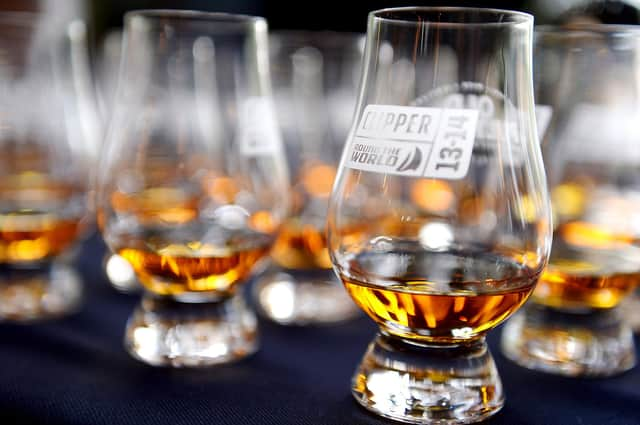Scottish whisky trade body backs court action against Canadian distillery over 'misleading' whisky branding


Scotch Whisky as a product is protected by geographical indication (GI), embedded in trademark law in countries across the globe.
Scotch can only be made from the raw materials of water, cereals and yeast and must be matured in Scotland for at least three years in oak casks.
Advertisement
Hide AdAdvertisement
Hide AdThe term ‘Scotch Whisky’ has itself been enshrined as one of the geographical indications protected by the Trademarks Act in Canada since 1998.
While the claim filed with the Vancouver registry of the British Columbia Supreme Court stated that Plaintiffs SWA and Whyte and Mackay will not be seeking damages against Macaloney Distillers or seeking to object to the distilling and bottling of whisky on their premises, it presents a clear stand from the Scottish companies against Macaloney Distillers’ use of Scotch Whisky’s distinctive appeal for marketing and branding purposes.
The notice for the civil claim filed with the Canadian court outlined that the Plaintiffs “bring this action to address the Defendant’s wrongful conduct, which misleads Canadian consumers into believing (incorrectly) that the Defendant’s Canadian-made whiskies and spirits, which are distilled and matured in Victoria, British Columbia, are from Scotland.”
It added that the Plaintiffs “strongly object to the Defendant’s misleading branding and marketing of its whiskies, which confuses customers, prejudices makers of Scotch Whisky and dilutes the distinctive character and reputation of the Scotch Whisky geographical indication in Canada.”
Advertisement
Hide AdAdvertisement
Hide AdThe company previously sold Scotch Whisky blends, such as their Among the Heather Blended Malt Scotch Whisky distilled and matured at Blair Atholl, Clynelish, Ardmore & Caol Ila distilleries in Scotland, but are said to have discontinued these last year once their own single malts matured at their own distillery.
The award winning Canadian distiller, set up by Scottish ex-pat Graeme Macaloney and employing veteran Scottish distillers, currently markets a range of whiskies under the branding ‘Macaloney’s Caledonian’ with its staple Glenloy ‘island single malt’, selling for Canadian $124.99. The firm’s website explains: “The carton has an image of Vancouver Island that wraps around all four sides, befitting the fact that this is an ‘island whisky’”
A spokesperson from the Scotch Whisky Association said: “The SWA consistently takes action in our global markets to prevent the use of Scottish indications of origin on whisky which is not Scotch Whisky. This is vital to protecting both Scotland’s national drink and to ensuring that consumers across the world are clear about whether or not they are buying whisky that is produced in Scotland.
"It’s critical to us to ensure that spirits producers in other countries do not take advantage of the quality reputation of Scotch Whisky that our industry has built up over decades. It is important that anyone who wants to purchase a bottle of Scotch Whisky can do so with the confidence that what they are buying is authentic, and that products which aren’t Scotch Whisky are clearly differentiated.
Advertisement
Hide AdAdvertisement
Hide Ad“In this instance, we have objected to the company’s use of certain words and terms that are strongly associated with Scotland on their whisky products.
“We never take legal proceedings lightly, and the SWA is always open to a resolution which protects both the Scotch Whisky trade and consumers without the need for additional legal action."
Since its creation in 1960, the SWA has litigated on multiple occasions to uphold Scotch Whisky and protect the category to ensure the product’s authenticity to consumers and ensure that Scotch Whisky producers do not face undue competition in international markets.
The body also clamp down on the use of Scottish traditional imagery and terms like ‘Highland’, ‘Glen’, ‘Loch’ on whisky which would allow businesses to leverage the global reputation of Scotch Whisky to boost whisky sales.
Advertisement
Hide AdAdvertisement
Hide AdIn response, Macaloney Distillers commented: “In 2016, we took the proactive initiative to contact the SWA to understand their label requirements, and at that time were open and transparent about branding with 'Macaloney' and 'Caledonian'. At that time the SWA did not object to the names 'Macaloney' and 'Caledonian'.
"Since 2019, we started winning World Whiskies Awards (WWA) gold medals and responded to SWAs request in late 2019 to describe our Master Distiller not as a 'Scotch Master Distiller’ but as a 'Scottish Master Distiller'. We also agreed to prominently display 'Canadian' on our whiskies."
They continued: “Our labelling and packaging identify our products as Canadian, and our distillery in Victoria, British Columbia. Our premium whiskies also have a map of Vancouver Island prominently displayed on the packaging.
"We are proud to celebrate our heritage including the Scottish ancestry of our founder and the story of his family, and firmly believe we have the right to do so in a way that celebrates both that history and reputation as a leading Vancouver Island craft distillery.
Advertisement
Hide AdAdvertisement
Hide Ad“We do not, and never have used the geographic indicator 'Scotch Whisky’ on our Canadian products and strongly disagree with the SWA lawsuit’s assertion that our use of 'Caledonian', 'Macaloney', and other terms including 'Glen' 'Inver' and 'island whisky' are alternatives synonymous with Scotch Whisky.”